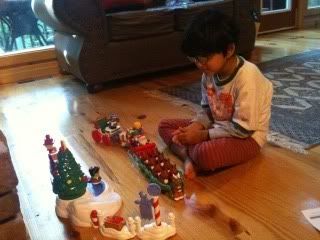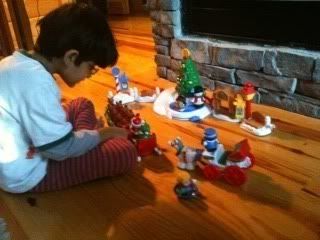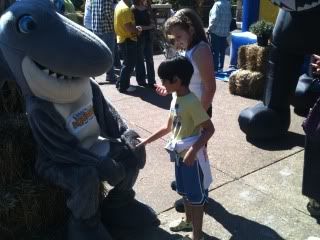Dr. Jed Baker was a phenomenal presenter.
Of all the speakers I thought he had the most useful and practical content for a parent.
Quick disclaimer: This is only a short summary. There was a lot more in his session . And obviously I see things from my own lens
PROACTIVE ( RATHER THAN REACTIVE ) APPROACH TO MELTDOWNS
Our own Attitude
It always starts with you – the parent, the teacher, the professional.
Not the child
Dr Baker asks us if we can tolerate our discomfort- our self image- our worry about what the other people around us are thinking about us -
Can we tolerate this discomfort long enough to think about what to do ?
Because that is the beginning.
Its important to reframe a meltdown and see it for what it really is
It's the lack of coping skills of the child .
Its not the child playing mind-games with you to challenge your authority
The question we have to ask ourselves is how we can teach better coping skills ( not the question "what is everybody thinking of me")
Why do children and specifically spectrum children have meltdowns?
Difficulty in perspective taking
In this case the misbehavior is often unintentional. (Example the attention wanting ASD kids who pulls the plug of the computer to get it to shut down in order to make the kids laugh ) The important thing is to teach perspective rather than discipline
Inflexibility: Poor problem solving skills
Its important to practice social skills and "in context". Often professionals do a "counseling session" and tell the child what they must do the next time they are in the situation
But they don't teach it in the situation.
Repetition and practice is critical
Low frustration tolerance
ASD kids get frustrated really easily ( Tony Attwood referred to some data which shows that Children with ASD have 10-15% larger amygdales – which means their primitive stress response such as fight , flight or freeze are stronger )
The child can get emotionally hijacked
Frustration tolerance is a skill that must be taught.
Dr Baker gave an example where there was a child that hated losing in games. So Dr Baker used a strategy of rewarding disappointment tolerance. Ie if a child tolerated X disappointments well – they would be rewarded.
Practice with these skills can expand basic abilities to tolerate frustration.
What should I do to prevent my child having a meltdown?
Prevention is key
Make the child feel competent.
When there is a task- such as homework - to be completed - follow the 80 -20 rule . DO the 80% easy stuff first. Then the hard 20% stuff
Avoid power struggles. Its best to problem solve together
Make sure the child does not have sensory triggers that are making it intolerable for him
If they are going into sensory overload teach them to be a self advocate for sensory break/better environment
Rewards new and better ways to self stim ( which really should be called Self-soothe, in my opinion )
Plan for the unexpected: when an unexpected crisis happens teach the child skills in advance such as
- Self talk: All problems can be solved if you wait and talk to the right person
- Create a relaxation folder for the child
- Establish a "safe person"
- Draw or write the thing that soothes you
Of course- the first thing to do – for you is to tolerate your own discomfort so you can think it through
It's important to understand why your child is having meltdown so you can plan for the future
If the child has been "emotionally hijacked" the best solution is to distract or soothe
Loss systems can work – but only if the child is present and aware.
In fact thinking about "extinguishing bad behaviors" when the child is distressed and emotionally hijacked is very counterproductive (and kind of cruel if you think about it )
All the change does not have to be in the child. The environment can be changed to help the child
This next set of ideas that Dr Baker gave is pure genius and a true game changer .
It's a wonder that every school in the world does not follow this system
In the Special needs world we worry a lot about the lack of social skills training for our kiddos .
In fact we talk about the shortage of resources all around
We also worry a lot about bullying as our kids are so vulnerable to bullies
Dr Tony Attwood likens the school to a jungle for our kiddos. With bullies prowling the corridors like tigers ( my friends and I were sort of depressed in fact after Dr Attwood's lecture as he touched upon one of our major fears )
Bullies cannot be stopped by teachers as it usually is invisible to them
Dr Jed Baker has the perfect solution - to solve bullying AND teach social skills
The solution is Peer Mentors
What if peers in the class were mentors for children with special needs ?
This is a win-win situation for all
Mentors learn valuable leadership skills like compassion and maturity
Special needs kids get to learn social skills from those who can model it and live in a kinder environment
And the community?
The community benefits because being a good person is actually cool
He has created such a program in a school in New Jersey.
He showed some video clips of students in this program in an excellent school in New Jersey that he had started and it really made us all want to move to New Jersey (Almost.)
I think this has to be the way we start to think of helping our children.
Fresh out-of-the-box thinking.
I hope this summary is helpful to you
Click here for his website
He has some excellent books which some of my friends who attended the conference with me recommended highly. And its next on my reading list
Click here to the link to his video of him talking about teaching Social skills to kids with AS
If you want to see a excellent video of him that Autism Hangout posted on youtube
All the change does not have to be in the child. The environment can be changed to help the child
This next set of ideas that Dr Baker gave is pure genius and a true game changer .
It's a wonder that every school in the world does not follow this system
In the Special needs world we worry a lot about the lack of social skills training for our kiddos .
In fact we talk about the shortage of resources all around
We also worry a lot about bullying as our kids are so vulnerable to bullies
Dr Tony Attwood likens the school to a jungle for our kiddos. With bullies prowling the corridors like tigers ( my friends and I were sort of depressed in fact after Dr Attwood's lecture as he touched upon one of our major fears )
Bullies cannot be stopped by teachers as it usually is invisible to them
Dr Jed Baker has the perfect solution - to solve bullying AND teach social skills
The solution is Peer Mentors
What if peers in the class were mentors for children with special needs ?
This is a win-win situation for all
Mentors learn valuable leadership skills like compassion and maturity
Special needs kids get to learn social skills from those who can model it and live in a kinder environment
And the community?
The community benefits because being a good person is actually cool
He has created such a program in a school in New Jersey.
He showed some video clips of students in this program in an excellent school in New Jersey that he had started and it really made us all want to move to New Jersey (Almost.)
I think this has to be the way we start to think of helping our children.
Fresh out-of-the-box thinking.
I hope this summary is helpful to you
Click here for his website
He has some excellent books which some of my friends who attended the conference with me recommended highly. And its next on my reading list
Click here to the link to his video of him talking about teaching Social skills to kids with AS
If you want to see a excellent video of him that Autism Hangout posted on youtube








